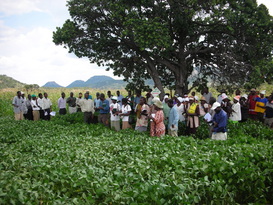 P. Mapfumo, University of Zimbabwe P. Mapfumo, University of Zimbabwe This is an educational website. Most of its articles have described the insights and methodologies of scientists, humanists and ordinary people who study climates past, present and future. Many conclude with a simple warning: to effectively address anthropogenic global warming, we need more inclusive ways to transform learning into practice. However, very few of these articles have explored how that can be done. With good reason: interdisciplinary work is never easy, and even harder is research that incorporates diverse perspectives from those closest to the effects of climate change. A new article in by Patti Kristjanson, Blane Harvey, Marissa van Epp, and Philip Thornton in the journal Nature Climate Change introduces “social learning” approaches as a way of integrating a wide range of perspectives into climate change research. According to the authors, social learning approaches "facilitate knowledge sharing, joint learning and knowledge co-creation between diverse stakeholders around a shared purpose, taking learning and behavioural change beyond the individual to networks and systems." In other words, social learning replaces traditional, linear educational relationships between those who have - or are perceived to have - money and power and those that don't. Many researchers have a vague desire to work with people "on the ground," but the concept of social learning provides a concrete, tested model for integrating diverse local perspectives into both research and subsequent practice. The following table, taken from the article, provides an example of the social learning approach applied to agricultural practices in Kenya: While improving agricultural practices was the key emphasis in Kenya, social learning also provides a means for more inclusive research. In doing so, it shortens the bridge between research and application. The first step of the social learning approach always involves gathering new information, and only in the second step are feasible options and solutions jointly identified with "research users:" those who actually apply information to practice. At every step along the way, local individuals - those actually affected by changing techniques and natural systems - are brought into the process. Ultimately all information is archived and made easily accessible for both researchers and local stakeholders. In that light, it is ironic that those not affiliated with a research institution can access this article only after paying $18. Moreover, there are some limitations to the social learning approach. For example, it is still not easy to identify how diverse kinds of knowing could be incorporated into research into climates past, present and future. The social learning model provides a framework for community engagement, but local circumstances are so different that this framework must necessarily remain vague. The social learning model is also much harder to apply to studies of past climates that go back more than a few decades, especially when research results are not immediately translatable to practice. Even then, however, community engagement often has value. Scholars should always seek to answer the big questions that matter to lay people. What are we doing, and why? How can those who aren't scientists or historians contribute? Will our results be accessible, and how are they applicable? The social learning approach cannot always be applied wholesale, but the social function and value of climate change research must be better articulated. Patti Kristjanson, Blane Harvey, Marissa Van Epp & Philip K. Thornton. "Social learning and sustainable development." Nature Climate Change 4, 5–7 (2014): 5-7.
2 Comments
|
Relevant Links1. Climate Change and Social Learning Wiki.
2. "Farmers and scientists: better together in the fight against climate change." CCAFS. 3. "Social Learning Theory." University of Southern Alabama. |

